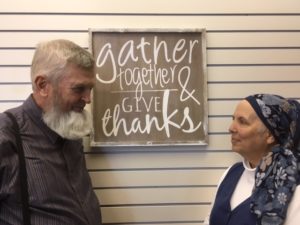Refreshing
By James Huskins
McDowell County
In spite of popular opinion, texting is not as good as face-to-face conversation, virtual reality is merely pretending, and milk does not come from almonds. Confusion about milk has been on my mind, because we have something that most Americans never experience: a milk cow and her newborn calf.
All species of mammals produce milk after they give birth. Most milk in North America comes from cows. Milk does not happen until after the process of conception, gestation, and birth. The act of having a calf—and thus being able to give milk—is called “freshening.” Ideally, a cow is rebred about three months after freshening to begin her nine-month gestation. She is “turned dry”—allowed to stop giving milk—ten months after freshening. Two months of rest from production, and the cycle begins anew. This process and its associated terms were common knowledge for most of our history, but when I tell people that my cow “came fresh” last week, I am generally treated to a blank stare.
I love the verb “to freshen.” It sums up the joy we find in owning a beautiful and gentle Jersey, the child-like delight surrounding the birth of a calf—this time a gorgeous female or heifer, the health benefits we and our family receive from the enzymes, proteins, healthy fat, and beneficial bacteria found only in fresh, unprocessed milk, and—best of all—the eye-popping thrill of the taste of fresh, raw, whole milk. Joyful Jersey Juice. Our milk is, in every way, refreshing. When God’s people needed to be refreshed following centuries of enslavement, He led them to a land flowing with milk and honey.
Refreshment is a powerful, Biblical theme. King Saul’s disobedience led to God abandoning him. Saul then suffered from a “distressing spirit” and could not relax or sleep. 1 Samuel 16:23 says that when David played the harp, Saul was “refreshed and well, and the distressing spirit would depart.” One of the Hebrew words translated “refresh” is “naphash.” It means to breathe or be breathed upon. It is closely related to “ruach”—spirit—and also to “nephesh” which is generally translated “soul.” In Hebrew terms, a “soul” is the union of a body made of earth and the spirit or breath of God. It takes both body and spirit to be a soul, and Jesus came to redeem—refresh—our soul on resurrection day. He did not come to free our spirit from the confines of our body. The idea that our “soul” can be separated from our body is a Greek concept, not Hebrew. In Hebrew thought, a “soul” is a lump of mud made alive and fresh by the breath of God.
We’ve been told that the Gospel was something new after Calvary, but Hebrews 4:2 tells us that the Gospel was proclaimed to the children of Israel at Sinai. Not a different Gospel. Not a stale, burdensome list of rules. Not an impossible barrier between us and God. Those folks were given the unvarnished “Good News” along with clear instruction that His people must obey Him. The gospel they heard was not “Pasteurized” and “homogenized” and “sanitized” to make it “safe.” God’s instruction for living was pure refreshment for a nation attempting to shake the bonds of slavery, but His Torah was also the basis for a covenant, and that covenant requires obedience.
In Jeremiah 31:31,32 God promises a “new” covenant with: “The house of Judah and the house of Israel.” Most Christians stop at that point and miss the terms of that new covenant in verse 33: “For this is the covenant that I will make with the house of Israel after those days, declares the LORD: I will put my Torah within them, and I will write it on their hearts.” The “new” covenant is nothing more—or less—than God writing His perfect Torah on our hearts rather than on tablets of stone. Many Christians claim that Hebrews 8:6 somehow proves that Torah has been nullified. “The covenant He mediates is better since it is enacted on better promises.” Those “better promises” are that His children will find purpose and delight and refreshment through keeping Torah. We have no doubt that this is the Hebrew writer’s message because he immediately quotes Jeremiah 31:33 “I will put my Torah into their minds and write it on their hearts.” (Hebrews 8:10)
Our culture is enamored with “new” and “different.” We want the latest and the best. We’ve been taught that the “new” covenant cancelled everything before it, but our creator has been working since day one to teach us how to live in harmony with Him, with each other, and with His world. His teaching is not new, grace is not new, and He has not changed.
A new moon is not new, its cycle is refreshed. A new garden is only new in the sense that the miracle of growth starts afresh. A fresh cow is not a different creature, but her capacity to serve her master is dramatically improved. The new covenant made possible by Jesus’ sacrifice means that the burden of our past sin is taken away, and we are saved by grace through faith. Once we are saved, God’s Holy Spirit breathes into us the realization that the only appropriate response to salvation is to walk as Jesus walked.
How did He walk? He kept Torah. The ONLY way to love and serve Him is to do the same. What a refreshing option that would present to the lost and dying world around us.
And remember that almonds never lactate.
Obedient Heart Fellowship believes that the entire Bible is true and relevant. We accept salvation by grace through faith in Jesus, and we attempt to love and serve Him by keeping his commandments. We meet each Sabbath—Seventh Day—at Abba’s House, 72 South Main Street in Marion. 10:00 A.M. 828-460-7913
__________________________________________________
Jim & Beverly Huskins are members of Obedient Heart Fellowship in McDowell County. Beginning July 2, 2022 Obedient Heart Fellowship will meet at 10:00 Each Sabbath (Seventh Day) in space graciously shared by New Covenant Church in Christ. 2460 US 221 Business N. In Marion, NC. Call for info. 828-460-7913. You can read more good Christian news from Jim HERE.
__________________________________________________






